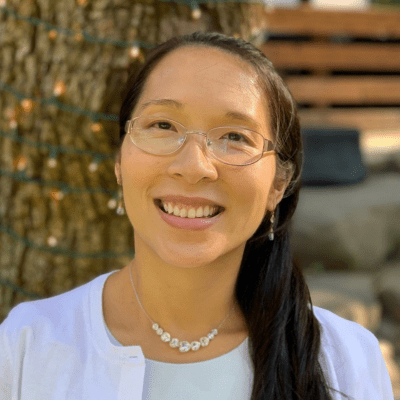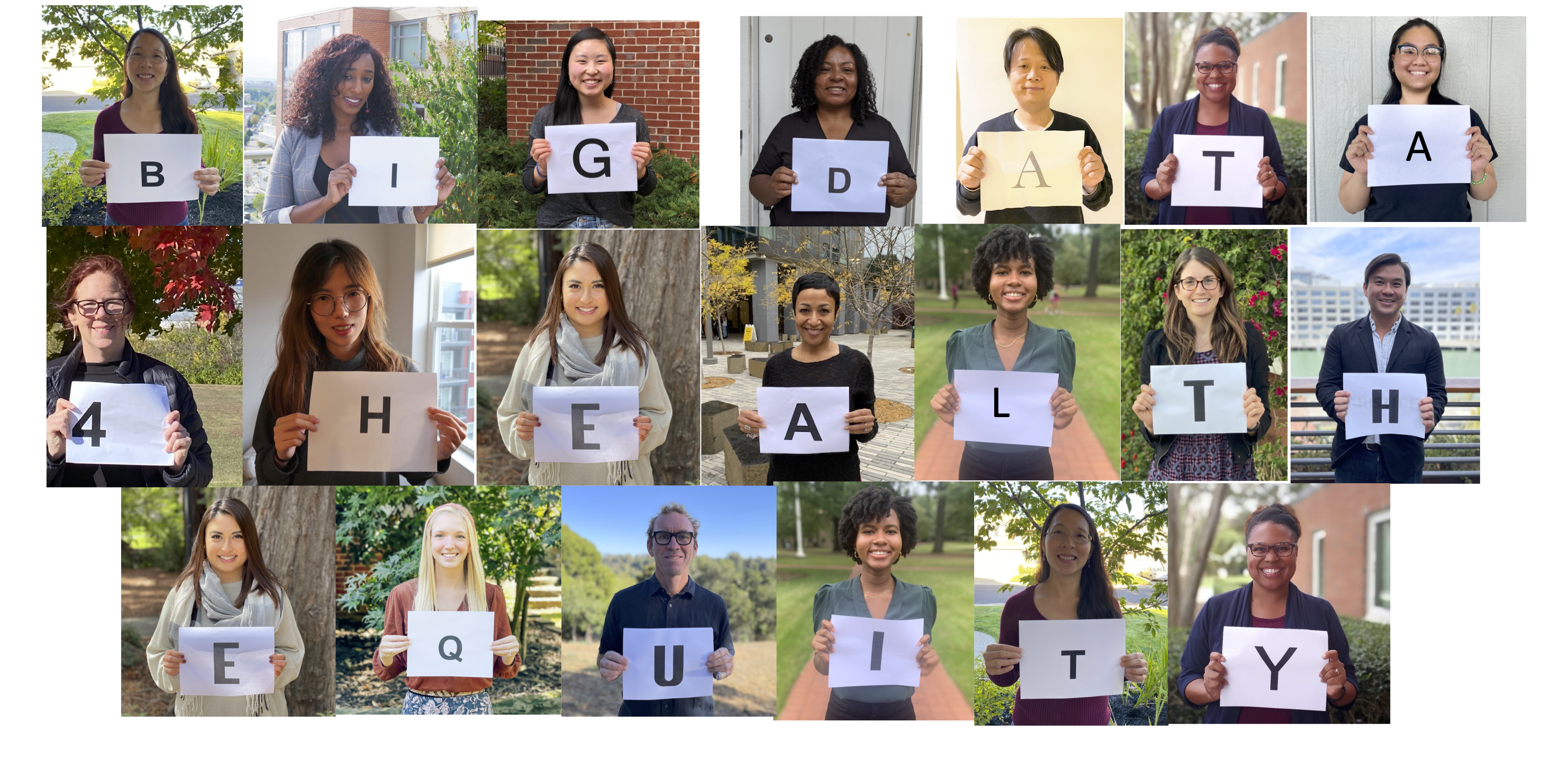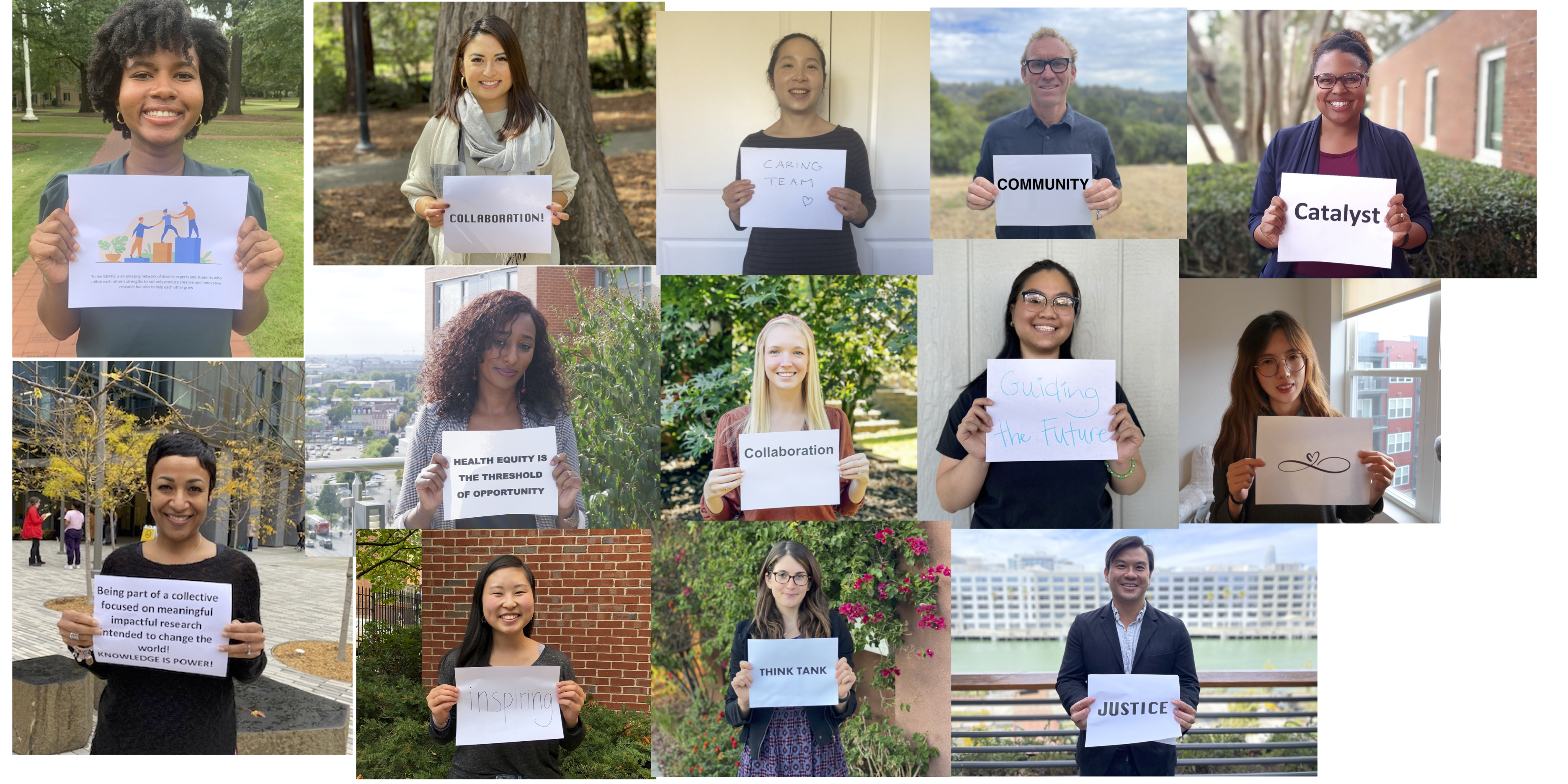The Big Data for Health Equity collaborative investigates the impact of the social, cultural and built environment on health disparities and identifies levers for change. One theme of our research has been the measurement of area-level racial attitudes and quantifying its impact on health using both machine learning algorithms and qualitative approaches. An overarching objective of the group is to provide a formal space for training, mentorship, and collaboration.

Thu Nguyen, ScD, MSPH is an associate professor in the Department of Epidemiology and Biostatistics at the University of Maryland School of Public Health. She is an epidemiologist whose research focuses on the impact of modifiable social factors on minority health and health disparities. Dr. Nguyen uses a variety of different data sources (including Big Data) and approaches (including quantitative and qualitative research methods) to advance our understanding of social determinants of health. She is the principal investigator of a National Institutes of Health Pathway to Independence Award to create a novel state and county-level indicator of racial attitudes and bias using Twitter data and to examine its associations with birth outcomes and racial/ethnic disparities in birth outcomes. Dr. Nguyen received her BA in Human Biology from Stanford University, her MSPH in Epidemiology from UNC Gillings School of Global Public Health, and her ScD in Social Epidemiology from the Harvard T.H. Chan School of Public Health.
Amani M. Allen is an associate professor of community health sciences and epidemiology at the University of California, Berkeley, School of Public Health. Her broad research interest is to integrate concepts, theories and methods from epidemiology and the social and biomedical sciences to examine racial inequalities in health as they exist across populations, across places and over the life course. Dr. Allen considers herself to be more “exposure” than “outcomes” focused, which is consistent with her interests in examining social factors such as “race” and “socioeconomic position” as exposures that serve as the foundation for the creation and preservation of health disparities across a number of outcomes. She is interested in how these social exposures determine life experiences and opportunities differently for different social groups and how those differences become embodied and impact mental and physical health and well-being. Dr. Allen’s work employs a mix of quantitative and qualitative data for understanding racial health disparities, informing the measurement of social determinants and addressing concerns related to internal validity challenges in health disparities research. Dr. Allen has published in top scientific journals including the American Journal of Public Health, American Journal of Preventive Medicine, Annals of Epidemiology, Psychoneuroendocrinology–where her paper examining racial discrimination, educational attainment and biological dysregulation among African American women was named Editor’s Choice (2019), and Annals of the New York Academy of Sciences where her recent paper examining racial discrimination, superwoman schema, and allostatic load among African-American women was highlighted as the cover feature. Dr. Allen and her work have been featured on NPR, CBSNews, BlackPress USA, the Urban League, Essence Magazine, US News & World Report, The Guardian, SF Chronicle, The Atlantic, WebMD, CNN, and MSNBC, among others.
Shaniece Criss, ScD, MPH, MPA is a health science faculty member at Furman University and a community-engaged qualitative researcher addressing health equity and health communication. Dr. Criss is an elected official on Travelers Rest City Council and serves on the board of directors for Prisma Health, the largest not-for-profit health organization in South Carolina serving more than 1.2 million patients annually. Recently, she was recognized as one of eleven leaders from across the state with the “Women Vision SC” Award from ETV. With a passion to implement effective interventions and policies, she earned her doctorate from Harvard T.H. Chan School of Public Health and Master of Public Administration from Harvard Kennedy School of Government, where she was awarded a Presidential Public Service Fellowship. She has a Master of Public Health from Emory University and an undergraduate degree in communication from Oglethorpe University. As a public health practitioner, Dr. Criss served as producer and host for a national television show for the Ministry of Health in Guyana during her Peace Corps service. She also held positions at ICF International, Centers for Disease Control, and CNN.
M. Maria Glymour, ScD MS is a professor in the Department of Epidemiology and Biostatistics at the University of California, San Francisco. Her research focuses on health inequalities, healthy cognitive aging, and particularly time-varying life course determinants of stroke and dementia (Alzheimer’s, vascular, and mixed etiologies) risk in late life. To this goal, she has drawn on both design and data innovations, in particular applying instrumental variables (IV), difference-in-difference, and multilevel models to novel data linkages to evaluate causal hypotheses. Her work emphasizes new insights that can be gained by linking data from multiple levels and sources, e.g., administrative records on social and health policy with individual-level records on health outcomes. Much of this research evaluates recent improvements in research methods to help address causal inference challenges related to dementia, including confounding, mediation, and measurement error issues. She was trained as a social epidemiologist, served as co-editor of the 2nd edition of the Social Epidemiology textbook and has
published extensively about life course socioeconomic factors that influence healthy aging. Dr. Glymour has a strong research track record, with both federal and foundation funding, and over 200 peer-reviewed publications, invited editorials or commentaries, and several substantive and methodological book chapters.

Quynh Nguyen, PhD MSPH is an associate professor of epidemiology and biostatistics at the University of Maryland School of Public Health, College Park, MD. Dr. Nguyen is a social epidemiologist focusing on contextual and economic factors as they relate to health. She has extensive experience using numerous national and international population-based health surveys to examine social and economic predictors of health and to quantify national and international patterns in health disparities. Her current research program focuses on creating and validating neighborhood indicators constructed from nontraditional Big Data sources such as social media data and Google Street View images. She received a K01 career development grant through the Big Data to Knowledge Initiative (BD2K) and an R01 from the National Library of Medicine to pursue this research program (K01ES025433; R01LM012849).
Heran Mane is a data scientist. In 2020, she embarked on a career in data analysis when she enrolled in a data science certification program at George Washington University. She transitioned into a data analysis career after working for more than 10 years in the restaurant industry. She began as a hostess and worked her way up to the board of directors, where she learned how important data is and how misleading it can be when we fail to control for biases. Currently, she is applying her data analysis training and real-world experience in multiple research programs that leverage data analysis to reveal biases in public health. As an undergraduate, she studied biology and psychology at Lindsey Wilson College.
Marina Yue, MS, is a data analyst in the School of Public Health at UMD College Park. She obtained her MA from Vanderbilt University in Data Science. She has a deep-rooted passion for applying data science to solve people’s problems and make their lives better. She has developed an expanding range of skill sets around big data and statistical analysis, natural language processing and the development of predictive models. Currently, her projects are focusing on social media data analysis and digital image processing to examine the associations with people’s health outcomes.
Junaid S Merchant, PhD, MS is a data analyst in the Epidemiology and Biostatistics department in the School of Public Health at UMD College Park. He comes from a background in psychology and neuroscience, and has a decade of experience researching social cognition. After completing his PhD in Neuroscience and Cognitive Science, Junaid brought his background to the BD4HE team to pursue research on social determinants of health inequalities. When he's not crunching numbers, Junaid enjoys painting, running, and going to concerts.
- Development of deep learning model to detect racial sentiment and expressions of hate and prejudice from Twitter, Facebook, and Instagram
- Using time of race-related events to investigate how changes in racial attitudes and racial bias are associated with changes in adverse birth outcomes and other health outcomes
- Qualitative research examining experiences of racism
- Broadly examining the impact of online social environment and tools using AI on health inequities
- Michaels EK, Lam-Hine T, Nguyen TT, Gee GC, Allen AM. The Water Surrounding the Iceberg: Cultural Racism and Health Inequities. Milbank Q. 2023 Jul 12. doi: 10.1111/1468-0009.12662. Epub ahead of print. PMID: 37435779.
- Hswen Y, Yang F, Le-Compte C, Hurley ME, Mattie H, Nguyen TT. Structural racism through Sundown towns and its relationship to COVID-19 local risk and racial and ethnic diversity. Preventive Medicine Reports. 2023;35:102260.
- Nguyen TT, Merchant JS, Criss S, Makres K, Gowda KN, Mane H, Yue X, Hswen Y, Glymour MM, Nguyen QC, Allen AM. Examining Twitter-Derived Negative Racial Sentiment as Indicators of Cultural Racism: Observational Associations With Preterm Birth and Low Birth Weight Among a Multiracial Sample of Mothers, 2011-2021. J Med Internet Res 2023;25:e44990
- Criss S, Kim M, De La Cruz MM*, Thai N#, Nguyen QC, Hswen Y, Gee GC, Nguyen TT . (2023). Vigilance and Protection: How Asian and Pacific Islander, Black, Latina, and Middle Eastern Women Cope with Racism. Journal of racial and ethnic health disparities, 10.1007/s40615-023-01560-2. Advance online publication. https://doi.org/10.1007/s40615-023-01560-2
- Nguyen TT, Yu W*, Merchant JS, Criss S, Kennedy, CJ, Mane H, Gowda KN*, Kim M#, Belani R^, Blanco CF*, Kalachagari M^, Yue X, Volpe VV, Allen AM, Hswen Y, Nguyen QC. Examining Exposure to Messaging, Content, and Hate Speech from Partisan News Social Media Posts on Racial and Ethnic Health Disparities. Int. J. Environ. Res. Public Health 2023, 20, 3230. https://doi.org/10.3390/ijerph20043230
- Criss S, Nguyen TT, Michaels EK**, Gee GC, Kiang MV, Nguyen QC, Norton S#, Titherington E#, Nguyen L#, Yardi S#, Kim M#, Thai N#, Shepherd A#, Kennedy CJ. Solidarity and strife after the Atlanta spa shootings: a mixed methods study characterizing Twitter discussions by qualitative analysis and machine learning. Front. Public Health. 2023. doi: 10.3389/fpubh.2023.952069.
- Nguyen TT, Criss S, Kim M#, De La Cruz MM*, Thai N#, Merchant JS, Hswen Y, Allen AM, Gee GC, Nguyen QC. Racism During Pregnancy and Birthing: Experiences from Asian and Pacific Islander, Black, Latina, and Middle Eastern Women. J Racial Ethn Health Disparities. 2022 Nov 30:1–11. doi: 10.1007/s40615-022-01475-4. Epub ahead of print. PMID: 36449130; PMCID: PMC9713108.
- Mane H, Yue X, Yu W, Doig AC, Wei H, Delcid N, Harris A-G, Nguyen TT, Nguyen QC. Examination of the Public’s Reaction on Twitter to the Over-Turning of Roe v Wade and Abortion Bans. Healthcare. 2022; 10(12):2390. https://doi.org/10.3390/healthcare10122390.
- Nguyen Q, Belnap T, Dwivedi P, Deligani A, Kumar A, Li D, Whitaker R, Keralis J*, Mane H, Yue X. Nguyen TT, Tasdizen T, Brunisholz KB. Google Street View Images as Predictors of Patient Health Outcomes, 2017–2019. Big Data and Cognitive Computing. 2022; 6(1):15.
- Hamad R, Glymour MM, Calmasini C, Nguyen TT, Walter S, Rehkopf DH. Explaining the variance in cardiovascular disease risk factors: A comparison of demographic, socioeconomic, and genetic predictors. Epidemiology. 2022 Jan 1;33(1):25-33. doi: 10.1097/EDE.0000000000001425. PMID: 34799480; PMCID: PMC8633061.
- Nguyen TT, Nguyen QC, Rubinsky AD, Tasdizen T, Deligani AHN, Dwivedi P, Whitaker R, Fields JD, DeRouen MC, Mane H, Lyles CR, Brunisholz KD, Bibbins-Domingo K. Google Street View-Derived Neighborhood Characteristics in California Associated with Coronary Heart Disease, Hypertension, Diabetes. Int J Environ Res Public Health. 2021 Oct 3;18(19):10428. doi: 10.3390/ijerph181910428. PMID: 34639726; PMCID: PMC8507846.
- Nguyen, T.T., Criss, S., Michaels, E.K., Cross, R.I., Michaels, J.S., Dwivedi, P., et al. (2021). Progress and push-back: How the killings of Ahmaud Arbery, Breonna Taylor, and George Floyd impacted public discourse on race and racism on Twitter. SSM - Population Health, 15, 100922. https://doi.org/10.1016/j.ssmph.2021.100922
- Criss S, Nguyen TT, Norton S, Virani I, Titherington E, Tillmanns EL, Kinnane C, Maiolo G, Kirby AB, Gee GC. Advocacy, Hesitancy, and Equity: Exploring U.S. Race-Related Discussions of the COVID-19 Vaccine on Twitter. International Journal of Environmental Research Public Health. 2021,18,5693 https://doi.org/10.3390/ijerph18115693
- Nguyen TT, Huang D, Michaels EK, Glymour MM, Allen AM, Nguyen QC. Evaluating associations between area-level Twitter-expressed negative racial sentiment, hate crimes, and residents’ racial prejudice in the United States. Social Science & Medicine – Population Health. 2021;13:100750. https://doi.org/10.1016/j.ssmph.2021.100750
- Thomas MD, Michaels EK, Darling-Hammod S, Nguyen TT, Glymour MM, Vittinghoff E. Whites’ county-level racial bias, COVID-19 rates, and racial inequities in the United States. Int. J. Environ. Res. Public Health. 2020.https://doi.org/10.3390/ijerph17228695
- Nguyen TT, Criss S, Dwivedi P, Huang D, Keralis J, Hsu E, Phan L, Nguyen LH, Yardi I, Glymour MM, Allen AM, Chae DH, Gee GC, Nguyen QC. Exploring U.S. Shifts in Anti-Asian Sentiment with the Emergence of COVID-19. Int. J. Environ. Res. Public Health 2020, 17, 7032. https://doi.org/10.3390/ijerph17197032
- Darling-Hammond S, Michaels EK, Allen AM, Chae DH, Thomas MD, Nguyen TT, Mujahid MM, Johnson RC. After “The China Virus” Went Viral: Racially Charged Coronavirus Coverage and Trends in Bias Against Asian Americans. Health Education & Behavior. September 2020. doi:10.1177/1090198120957949 https://doi.org/10.1177/1090198120957949
- Nguyen TT, Adams N, Huang D, Glymour MM, Allen AM, Nguyen QC. The Association Between State-Level Racial Attitudes Assessed From Twitter Data and Adverse Birth Outcomes: Observational Study. JMIR Public Health Surveill. 2020 Jul 6;6(3):e17103. doi: 10.2196/17103. PubMed PMID: 32298232.https://doi.org/10.2196/17103
-
Shaniece Criss. Having Babies: From Cotton Fields to Twitter. TEDxFurmanU. Video: https://youtu.be/8JjAyB3pcbU. Dr. Shaniece Criss highlights research with Dr. Thu Nguyen in her TED talk, May 15, 2023
-
Musings from the Mezzanine: Innovations in Health Information from the Director of the National Library of Medicine: Can Computer Vision Models Help Us Picture Better Health Outcomes? February 15, 2023
-
The Daily Californian: Study shows temporary decline in anti-Black sentiment following George Floyd’s death
October 12, 2021 -
Maryland Today: Study: Anti-Black Racism Fell—Temporarily—Following Floyd’s Killing
September 27, 2021 -
Maryland Today: $3.3M NIH Grant to Search for Twitter Links Between Racism, Birth Outcome
March 2, 2021 -
Furman University News: NIH Study Funds New Way to Measure Link Between Racal Inequity and Preterm Births
March 16, 2021 -
Furman University News: Studying the Health Impications of Racist Tweets
January 22, 2021 -
PRB: High Premature Birth Rates Among U.S. Black Women May Reflect the Stress of Racism and Health and Economic Factors
January 21, 2021 -
SouthCarolinaETV Video: Dr. Shaniece Criss | Women Vision SC 2020
June 18, 2020 -
Chicago Tribune Commentary: Racism is the other virus sweeping America during this pandemic
April 20, 2020
Advancing Big Data Methods in Population Health to Improve Health Equity

We are a collaborative of faculty, trainees, and students from universities across the US committed to advancing theories, methods, and findings related to the use of Big Data for health equity research.
Department: Epidemiology and Biostatistics
Room Number: TBD
Director: Dr. Thu Nguyen
Office Phone Number: TBD
Email: ttxn@umd.edu
Meet Our Collaborators!

